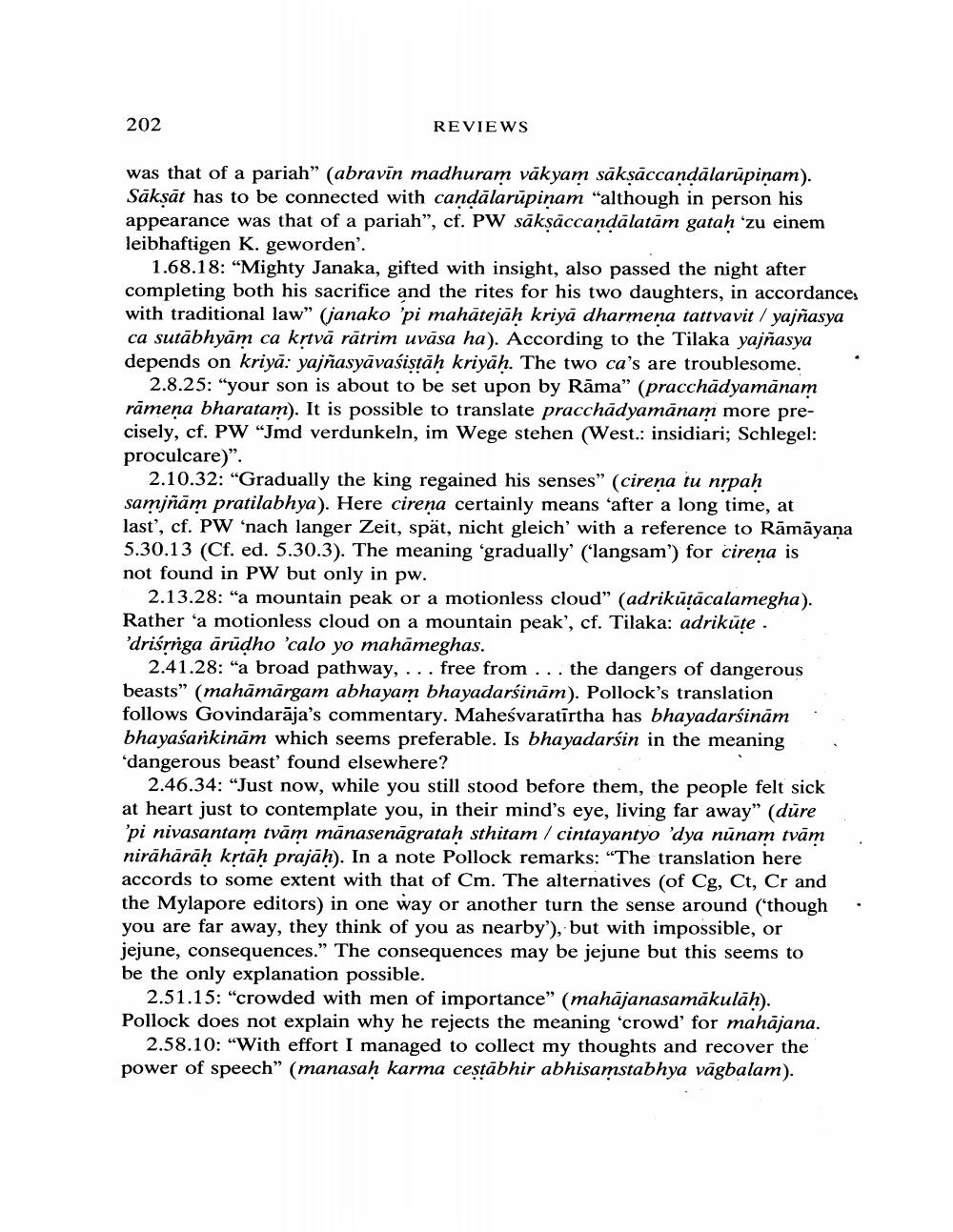Book Title: Reviews Of Diffeent Books Author(s): J W De Jong Publisher: J W De Jong View full book textPage 8
________________ 202 REVIEWS was that of a pariah” (abravīn madhuram vākyam sākṣāccandalarūpinam). Sākṣāt has to be connected with candalarūpinam "although in person his appearance was that of a pariah”, cf. PW sākṣāccandālatām gataḥ‘zu einem leibhaftigen K. geworden'. 1.68.18: “Mighty Janaka, gifted with insight, also passed the night after completing both his sacrifice and the rites for his two daughters, in accordance, with traditional law” (janako 'pi mahātejäh kriya dharmena tattvavit / yajñasya ca sutābhyam ca krtvā rātrim uvāsa ha). According to the Tilaka yajñasya depends on kriya: yajñasyāvašistāh kriyah. The two ca's are troublesome. 2.8.25: "your son is about to be set upon by Rāma” (pracchädyamānam rāmeņa bharatam). It is possible to translate pracchădyamānam more precisely, cf. PW "Jmd verdunkeln, im Wege stehen (West.: insidiari; Schlegel: proculcare)". 2.10.32: "Gradually the king regained his senses" (cireņa tu nrpah samjñām pratilabhya). Here cirena certainly means 'after a long time, at last', cf. PW 'nach langer Zeit, spät, nicht gleich' with a reference to Rāmāyana 5.30.13 (Cf. ed. 5.30.3). The meaning 'gradually' ('langsam') for cirena is not found in PW but only in pw. 2.13.28: “a mountain peak or a motionless cloud” (adrikütācalamegha). Rather 'a motionless cloud on a mountain peak’, cf. Tilaka: adriküte. 'driśrniga ārūdho 'calo yo mahāmeghas. 2.41.28: "a broad pathway, ... free from ... the dangers of dangerous beasts” (mahämärgam abhayam bhayadarśinām). Pollock's translation follows Govindarāja's commentary. Maheśvaratirtha has bhayadarsinām . bhayaśarkinām which seems preferable. Is bhayadarsin in the meaning 'dangerous beast' found elsewhere? 2.46.34: “Just now, while you still stood before them, the people felt sick at heart just to contemplate you, in their mind's eye, living far away” (düre 'pi nivasantam tvām mānasenāgrataḥ sthitam / cintayantyo 'dya nūnam tvām nirāhārāh krtāḥ prajah). In a note Pollock remarks: “The translation here accords to some extent with that of Cm. The alternatives (of Cg, Ct, Cr and the Mylapore editors) in one way or another turn the sense around (though you are far away, they think of you as nearby'), but with impossible, or jejune, consequences.” The consequences may be jejune but this seems to be the only explanation possible. 2.51.15: “crowded with men of importance" (mahājanasamākulāh). Pollock does not explain why he rejects the meaning crowd for mahājana. 2.58.10: "With effort I managed to collect my thoughts and recover the power of speech” (manasaḥ karma cestābhir abhisamstabhya vāgbalam).Page Navigation
1 ... 6 7 8 9 10 11 12 13 14 15 16 17 18 19 20 21 22 23 24 25 26 27 28 29 30 31 32 33 34 35 36 37 38 39 40 41 42 43 44 45 46 47 48 49 50 51 52 53 54 55 56 57 58 59 60
